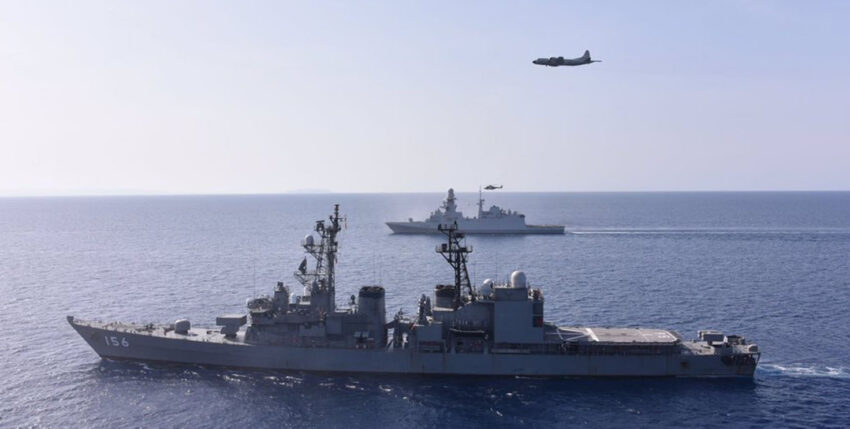On 10 May, EU, Japanese and Djiboutian naval and naval air warfare assets conducted a joint exercise in the Gulf of Aden. The exercise was based on the scenario of an anti-piracy operation. The Italian frigate "Carabiniere", currently the flagship of Operation Atalanta, the destroyer "Setogiri" of the Japanese Maritime Self-Defence Force (JMSDF), a Spanish P 3-M maritime reconnaissance vessel, patrol boats of the Djibouti coast guard and command structures of the African state's navy were involved. The exercise, which lasted around twenty hours, is of a rather demonstrative nature. It emphasises the commitment of those involved to maintaining the rules-based international order. "Together with other partners, the EU, Japan and Djibouti will continue to contribute to maintaining and strengthening the stability, security, prosperity and sustainable development of the region," reads the EU External Action Service communiqué of 11 May 2021. On 19 April 2021, the EU Foreign Affairs Council adopted an EU strategy for cooperation in the Indo-Pacific. In it, the EU commits to greater political engagement in the region to contribute to its stability, security, prosperity and sustainable development based on the promotion of democracy, the rule of law, human rights and international law, in line with the EU's canon of values. Joint activities to promote maritime safety in the region are also to be intensified. Japan welcomes the strategy as a sign of the EU's strong commitment to the Indo-Pacific - see the press release issued by the Japanese Ministry of Defence on 11 May 2021.
Units from the EU and Japanese naval forces exercised together from Djibouti back in October 2020. As in the current case, it is the naval and naval air forces of EU Naval Force Somalia - Operation Atalanta that have been mobilised on the EU side for the exercise.
Atalanta with a broader mandate
With its extension for a further two years until 31 December 2022, the mandate of Operation Atalanta was revised by Brussels on 1 January 2021. It now also includes tasks that strengthen the role of EU Naval Force Somalia - Operation Atalanta as a service provider for maritime security in the region. Non-executive tasks to prevent, combat and disrupt IUU fishing, trafficking in drugs, arms and charcoal have been added. At the same time, executive tasks can be performed in relation to illegal drug and arms trafficking - albeit limited to a specific area in the Gulf of Aden and only as a result of decisions by the relevant EU authorities. Note: IUU fishing stands for illegal, unreported or unregulated fishing.
Other coalitions in the region are also active in the fight against smuggling and piracy and in advocating free maritime transport. These include CTF 150, CTF 151 and EMASOH. CTF150 conducts Maritime Security Operations (MSO) outside the Persian Gulf to ensure freedom of navigation. Its activities are also aimed at preventing the smuggling of drugs and weapons. CTF 151 is an anti-piracy mission established in 2009 on the basis of a UN Security Council resolution (currently Resolution 2500 (2019)). EMASOH, the European Maritime Security Assistance Mission, is an initiative established and led by France. It aims to ensure freedom of navigation in the sea area around the Strait of Hormuz. EMASOH has a diplomatic pillar, which is supported by the naval units present in the region (at sea and in the air) - Operation Agénor. EMASOH was launched on 20 January 2020 by a joint declaration of European states. Belgium, Denmark, France, Germany, Greece, Italy, the Netherlands and Portugal are participating in EMASOH. Germany has not yet gone beyond political declarations of intent, although shipping in this region is immensely important for German foreign trade. The possibility of participation would arise with the passage of the "Bayern" during its voyage to the Indo-Pacific (on the outward and/or return journey). Participation in the EU mission EU Naval Force Somalia - Operation Atalanta could also be considered (see below).
Japan versus Germany
Japan has been involved in the western Indian Ocean since 2009. Originally, the Japanese naval forces operated independently against piracy and carried out maritime surveillance. They coordinated with the United States and eventually joined the US-sponsored CTF 151. In 2015 and 2020, Japan led CTF 151. Also in 2020, Tokyo deployed an additional force to the Arabian Sea/Persian Gulf to protect Japanese ships approaching the Strait of Hormuz. Since 2011, the armed forces of the Far Eastern country have also maintained a base in Djibouti with up to 180 soldiers.
On 21 April 2021, the German Bundestag approved the continued participation of armed German forces in the EU mission EU Naval Force Somalia - Operation Atalanta until 30 April 2022 at the latest. The upper limit of the mandate was reduced again and now stands at 300 soldiers. This figure only reflects the maximum number of forces that can theoretically be deployed.
The deployment of German soldiers in Djibouti ended on 16 April 2021. This does not mean the end of the German Navy's participation in EU Naval Force Somalia - Operation Atalanta. In 2008, when the European Union's first maritime task force was set up as EU Naval Force Somalia - Operation Atalanta, Germany participated directly in the mission. Over the years, this participation was repeatedly adapted to the regional situation. Initially, the Bundeswehr deployed ships and maritime reconnaissance aircraft to the Horn of Africa. Since 2017, only the capabilities of the P-3C Orion maritime patrol aircraft have been utilised. The next opportunity for participation with a seagoing unit would arise with the passage of the "Bayern" during its voyage to the Indo-Pacific (on the outward and/or return journey). Participation in EMASOH (see above) could give rise to a possible but resolvable conflict of objectives.
In view of the Japanese example, German participation in maritime operations to maintain the rules-based international order, including practical maritime cooperation to promote freedom of navigation and overflight, is lacking. Securing critical sea routes and protecting international maritime traffic as a prerequisite for the prosperity of the third-largest trading nation is something Berlin likes to proclaim - but does not practise.
Text: Hans-Uwe Mergener; Photo: JMSDF










